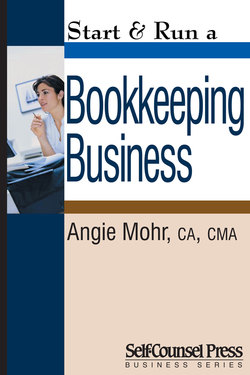Читать книгу Start & Run a Bookkeeping Business - Angie Mohr - Страница 11
Choosing Your Accounting Software
ОглавлениеGiven these general system requirements, what accounting software should you choose? And how will you know when it’s time to upgrade? Your considerations when choosing your first system are the same as when you will upgrade in the future. If you keep in mind your potential future record-keeping needs, this will help with your initial decisions.
You will at some point outgrow your current accounting system, whether you started out with a manual ledger, an Excel or Lotus spreadsheet, or simply a shoe box (or refrigerator box, depending on the number of receipts your business accumulates).
The need for a new accounting system may manifest itself in many different forms. You may find that payroll is becoming more onerous to calculate and track as you hire more employees. A manufacturing or resale business may keep running out of stock on high-turnover items because they are out before they know it. In a service business, you may start losing track of how much time should be billed to each customer. Regardless of the various symptoms, the problem remains the same: your bookkeeping system is taking more of your time than it’s worth.
There is always a balance in any business enterprise between time and money. You can spend either time or money (or both). Scrimping on one will cost you more of the other. For example, if you decide to buy the least-frills accounting package you can find on the shelves of your local office supply store, you may spend an extra ten hours per week forcing it to do what you want it to do. If you could take that ten hours and use it to sell more to your customers, then perhaps it would be worth spending more on the software package.
Recently, Deloitte & Touche did a study of the top criteria used by businesses when selecting their bookkeeping software. It’s quite interesting to see that first-time business owners and seasoned entrepreneurs have different priorities in this regard. This would suggest that experience teaches business owners what’s really important when choosing financial software.
The top three criteria used by first-time business owners when selecting bookkeeping software are —
(1) price of software,
(2) ease of implementation, and
(3) ease of use.
These reasons make sense. They are all important things to consider in the purchasing decision. But now take a look at the top three criteria used by businesses selecting their second bookkeeping system —
(1) level of support provided by the local firm
(2) developer’s track record of performance
(3) software’s ability to fit the business
What do the experienced business owners know that the neophytes don’t? Let’s take a look at each point separately.
Level of support provided by the local firm
Many of the entry-level accounting systems are billed as being turn-key systems; you just load the software and you’re up and running. However, setting them up is never quite that simple. It’s important to make sure that you can easily and economically access customer and technical support for your new system. Some software companies charge for support calls, which is fine as long as you can get hold of someone when you need them. You will also want to consider whether there are consultants based locally that can come into your business and provide customized setup and training. When you’re looking at consumer reviews of the product, pay special attention to what they say about support.
